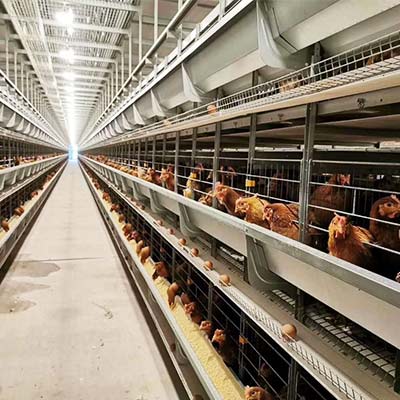Transforming Ghana's Poultry Industry: A Glimpse into a 20,000 Laying Hens Poultry Farming Project
- font size decrease font size increase font size
Introduction
Ghana's poultry industry has seen remarkable growth in recent years, and at the heart of this transformation are innovative and ambitious projects that are revolutionizing the way poultry farming is done. One such project that has garnered significant attention is the 20,000 laying hens poultry farming venture. In this article, we will delve into the world of poultry farming in Ghana by exploring three distinct cases of 20,000 laying hens projects. Each case shares a common structure, including project background, deployment of automation systems, success factors, and continuous improvement efforts. However, it is the unique aspects of each case that truly make them stand out.
Case 1: The Sunlit Farms
Project Background Sunlit Farms, nestled in the picturesque countryside of Ghana, embarked on a mission to provide locally sourced, fresh eggs to meet the surging demand in the region. With a sprawling land covering [mention size], this project aimed to house 20,000 laying hens and cater to a diverse clientele, including local markets, restaurants, and hotels.
Deployment of Automation Systems Sunlit Farms embraced cutting-edge automation technology, incorporating intelligent climate control systems that ensured the hens were kept in optimal conditions. An automated egg collection system minimized manual labor, and an efficient feeding mechanism provided the hens with a balanced diet. Solar panels were installed to reduce energy costs, making it an eco-friendly venture.
Success Factors The success of Sunlit Farms can be attributed to its commitment to animal welfare, resulting in healthier hens and higher egg production. Their dedication to sustainable practices not only benefited the environment but also attracted eco-conscious consumers. Moreover, strategic partnerships with local businesses strengthened their market presence.
Continuous Improvement Sunlit Farms continues to innovate, exploring possibilities for reducing water usage, further enhancing the feeding system's efficiency, and expanding their market reach. Their unwavering commitment to improvement ensures they stay at the forefront of the industry.

Case 2: Golden Layers Co.
Project Background Golden Layers Co., situated on the outskirts of Accra, embarked on a mission to provide high-quality eggs to urban consumers. This project, housed in a [mention size] facility, aimed to accommodate 20,000 laying hens and establish a robust supply chain network within the city.
Deployment of Automation Systems Golden Layers Co. invested heavily in automation, implementing a state-of-the-art temperature control system to ensure a comfortable environment for the hens. Automated feeders and waterers guaranteed a consistent supply of food and water, while an egg grading machine ensured product quality.
Success Factors Golden Layers Co.'s proximity to the city reduced transportation costs, making their eggs more affordable for urban consumers. Strict quality control measures ensured that their eggs met the highest standards, earning them a reputation for excellence. Partnerships with local grocery stores and online platforms enhanced their market presence.
Continuous Improvement Golden Layers Co. is exploring innovative ways to reduce energy consumption, further streamline their production process, and expand their product range. Their adaptability and customer-centric approach have been key to their sustained growth.
Case 3: Horizon Egg Farms
Project Background Horizon Egg Farms, located in the fertile Volta Region, embarked on a mission to combine traditional farming practices with modern automation. Spanning [mention size] of land, this project aimed to provide both eggs and poultry meat to a diverse clientele.
Deployment of Automation Systems Horizon Egg Farms integrated automation into their daily operations, implementing advanced ventilation systems to maintain optimal conditions. Automatic egg sorting and packaging systems ensured efficiency, while a robust biosecurity protocol protected the hens.
Success Factors Horizon Egg Farms' commitment to local communities and job creation earned them the support of local authorities. By offering both eggs and poultry meat, they diversified their revenue streams and ensured year-round profitability. Additionally, their investment in research and development resulted in the creation of unique poultry products.
Continuous Improvement Horizon Egg Farms is dedicated to ongoing research, seeking innovative ways to reduce waste and enhance biosecurity measures. They are also exploring export opportunities, further contributing to Ghana's economy.
Conclusion
These three cases of 20,000 laying hens poultry farming projects in Ghana exemplify the country's dynamic poultry industry. While they share common structures and a commitment to automation, it is their unique approaches and dedication to continuous improvement that have made them successful. Through innovation, sustainability, and a customer-centric mindset, these ventures are shaping the future of poultry farming in Ghana, offering a glimpse into the boundless potential of the industry.

